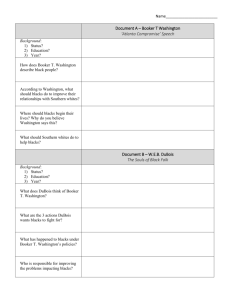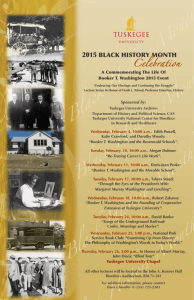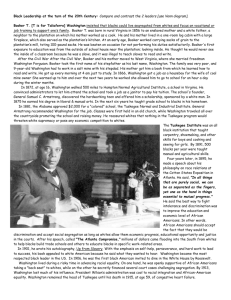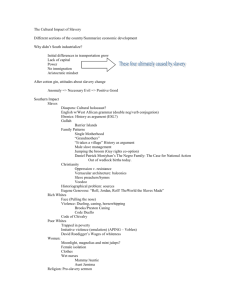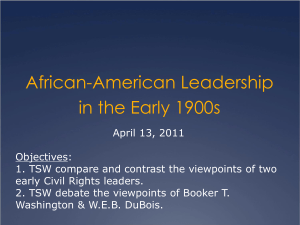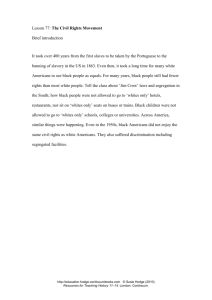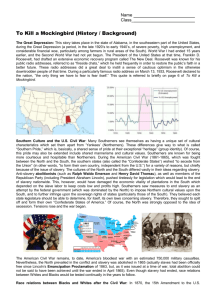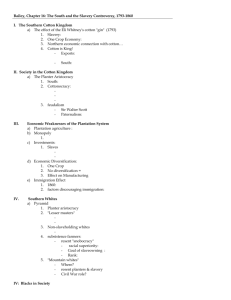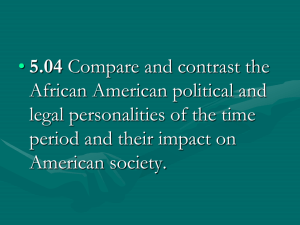booker t - Salem City Schools
advertisement
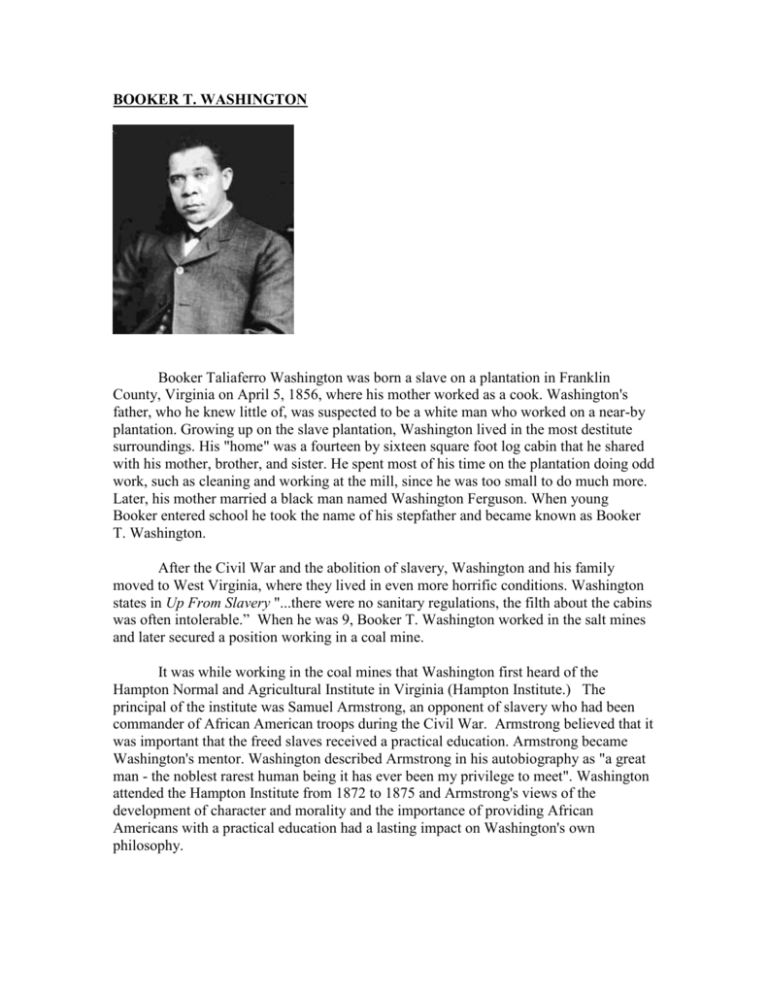
BOOKER T. WASHINGTON Booker Taliaferro Washington was born a slave on a plantation in Franklin County, Virginia on April 5, 1856, where his mother worked as a cook. Washington's father, who he knew little of, was suspected to be a white man who worked on a near-by plantation. Growing up on the slave plantation, Washington lived in the most destitute surroundings. His "home" was a fourteen by sixteen square foot log cabin that he shared with his mother, brother, and sister. He spent most of his time on the plantation doing odd work, such as cleaning and working at the mill, since he was too small to do much more. Later, his mother married a black man named Washington Ferguson. When young Booker entered school he took the name of his stepfather and became known as Booker T. Washington. After the Civil War and the abolition of slavery, Washington and his family moved to West Virginia, where they lived in even more horrific conditions. Washington states in Up From Slavery "...there were no sanitary regulations, the filth about the cabins was often intolerable.” When he was 9, Booker T. Washington worked in the salt mines and later secured a position working in a coal mine. It was while working in the coal mines that Washington first heard of the Hampton Normal and Agricultural Institute in Virginia (Hampton Institute.) The principal of the institute was Samuel Armstrong, an opponent of slavery who had been commander of African American troops during the Civil War. Armstrong believed that it was important that the freed slaves received a practical education. Armstrong became Washington's mentor. Washington described Armstrong in his autobiography as "a great man - the noblest rarest human being it has ever been my privilege to meet". Washington attended the Hampton Institute from 1872 to 1875 and Armstrong's views of the development of character and morality and the importance of providing African Americans with a practical education had a lasting impact on Washington's own philosophy. After his stay at the Hampton Institute, he found the skills that he was taught there were extremely instrumental and so he worked to open his own Normal and Agricultural Institute. On July 4, 1881, the Tuskegee Normal and Agricultural Institute (Tuskegee Institute) was opened in Alabama. The students built the early buildings of this institute themselves. The students of the Tuskegee Institute were taught to develop internally. They were taught how to take care of their money and health and how to conduct themselves in public. It is thought that this in one of Washington's greatest accomplishments. In 1895, Booker T. Washington agreed to be superintendent of Christiansburg Industrial Institute, in Montgomery County, Virginia (near modern Christiansburg High School.) A former plantation house served as the classroom building, while the male boarding students slept in renovated slave cabins. Vocational courses were geared towards gender expectations, with cooking and sewing for the girls and carpentry and animal husbandry for the boys. “Mansion House,” Academic Building at Christiansburg Institute Female students at Christiansburg Institute taught sewing Male students at Christiansburg Institute taught carpentry Washington believed that African-Americans should best gain equality to whites through establishing a solid labor force. Fighting for specific rights like voting was not part of his immediate agenda. He believed that the best interests of African-Americans could be achieved "through education in the crafts and industrial skills and the cultivation of the virtues of patience, enterprise, and thrift." For Washington, a slow acquisition of wealth and culture was the best way to gain equality. Booker T. Washington’s rise to national prominence came in 1895 with a brief speech which outlined his social philosophy and racial strategy. Washington was invited to speak before an integrated audience at the opening of the Cotton States and International Exposition held in Atlanta in September, 1895. He was the first African American ever to address such a large group of southern whites. Washington is remembered chiefly for this “Atlanta Compromise” address. In this speech, he called on white America to provide jobs and industrial-agricultural education for Negroes. In exchange, blacks would give up demands for social equality and civil rights. His message to the Negro was that political and social equality were less important as immediate goals than economic respectability and independence. Washington believed that if blacks gained an economic foothold, and proved themselves useful to whites, then civil rights and social equality would eventually be given to them. Blacks were urged to work as farmers, skilled artisans, domestic servants, and manual laborers to prove to whites that all blacks were not “liars and chicken thieves.” The philosophy of Washington was one of accommodation to white oppression. He advised blacks to trust the paternalism of the southern whites and accept the fact of white supremacy. He stressed the mutual interdependence of blacks and whites in the South, but said they were to remain socially separate: “In all things that are purely social we can be as separate as the fingers, yet one as the hand in all things essential to mutual progress.” Washington counseled blacks to remain in the South, obtain a useful education, save their money, work hard, and purchase property. By doing such things, Washington believed, the Negro could ultimately “earn” full citizenship rights. Because Washington’s program conciliated whites, substantial contributions from white philanthropists were given to Tuskegee and other institutions that adopted the Washington philosophy. Washington’s prestige grew to the point where he was regarded as the spokesman for the entire Negro community. With strong white support, Washington became the outstanding black leader not only in the fields of education and philanthropy, but in business and labor relations, politics and all public affairs. In 1901, Washington published his carefully executed and immensely popular autobiography, Up From Slavery. It is a classic “Horatio Alger” success story containing Washington’s program of accommodation and self-help. Up From Slavery gave an overly optimistic view of black life and race relations in America. It gave another boost to Washington’s career because it said what whites wanted to hear. African Americans who listened to the “Atlanta Compromise” Speech and read Washington’s autobiography thought that Washington should have been more militant. They could not topple Washington from power, but one of them did win recognition as a leader of the opposition—W. E. B. DuBois. In Tuskegee, Alabama on November 14, 1915, Booker T. Washington died.

